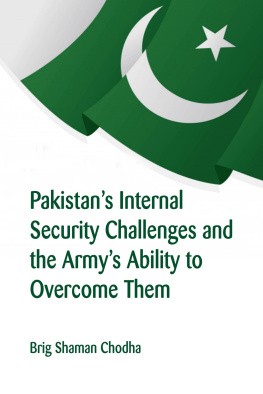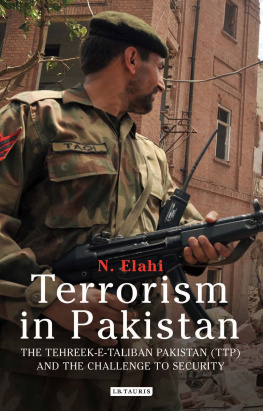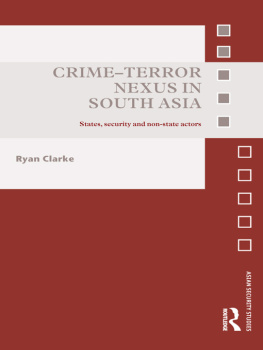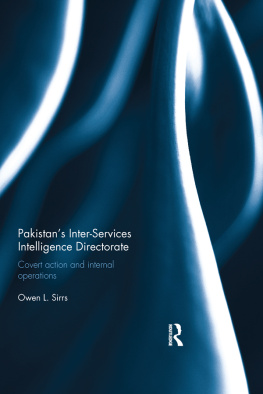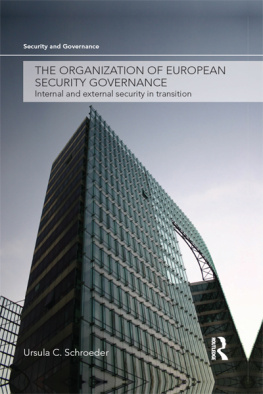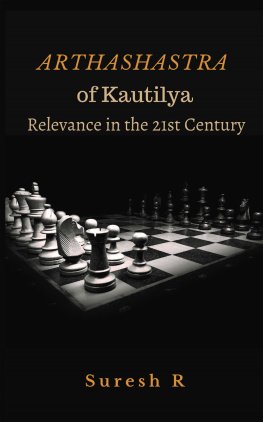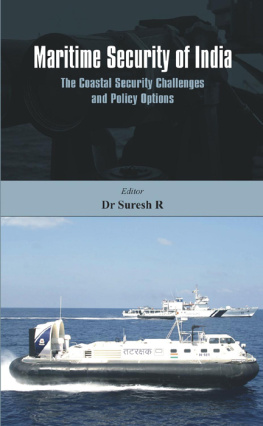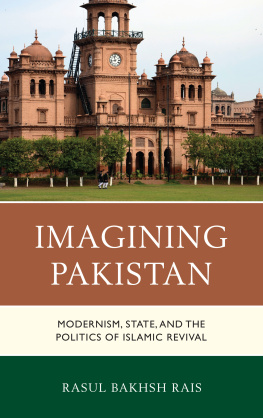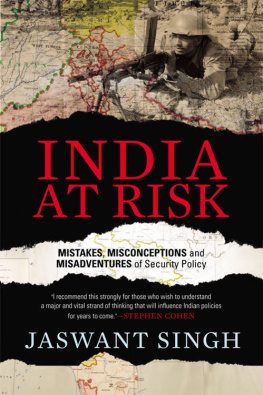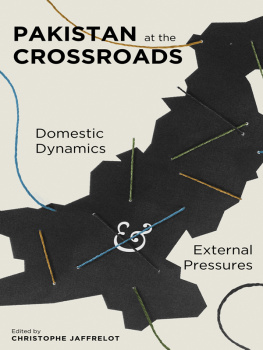PAKISTANS INTERNAL
SECURITY CHALLENGES
AND
THE ARMYS ABILITY TO
OVERCOME THEM
PAKISTANS INTERNAL
SECURITY CHALLENGES
AND
THE ARMYS ABILITY TO
OVERCOME THEM
by
Brigadier Shaman Chodha
United Service Institution of India
New Delhi
Vij Books India Pvt Ltd
New Delhi (India)
Published by
Vij Books India Pvt Ltd
(Publishers, Distributors & Importers)
2/19, Ansari Road
Delhi 110 002
Phones: 91-11-43596460, 91-11-47340674
M: 98110 94883
e-mail:
Copyright 2019, United Service Institution of India, New Delhi
ISBN: 978-93-88161-86-2 (Hardback)
ISBN: 978-93-88161-87-9 (ebook)
Price in India: 995/-
All rights reserved.
No part of this book may be reproduced, stored in a retrieval system, transmitted or
utilized in any form or by any means, electronic, mechanical, photocopying, recording
or otherwise, without the prior permission of the copyright owner. Application for such
permission should be addressed to the publisher.
The views expressed in the book are of authors/contributors and not necessarily those of
the USI or publishers.
Pakistan has paid a very heavy price for following the security narrative of its armed forces supported by religious outfits. It has lost more than 63000 lives since 2012 in terrorist incidents and sectarian violence, its economy is in shambles, society is polarized, education is crippled, media is frightened and the county is on verge of international isolation. It is an extremely high price to pay for the wrong policies followed by the State. A State which had for long used terror as an instrument of its foreign policy is today facing serious threat from terrorism. Pakistan policy of nurturing extremist groups as levers of foreign policy has come full circle and today it is facing serious existential challenges. The internal security challenge has met with tactical success due to strong military operations since 2002. Although military operations have controlled the worsening situation to an extent, however rising religious fundamentalism, radicalisation of society, ethno nationalism, sectarian violence, intolerance and jihadist outfits pose grave and rising threat to Pakistan.
The book, Pakistans Internal Security Challenges and the Armys Ability to Overcome them by Brigadier Shaman Chodha takes a de-novo look at the present internal security situation of Pakistan. It is a well timed book as the new Imran Khan Led government has taken over in Pakistan. The book critically examines the success or failure of Pakistans ambitious National Action Plan (NAP) and various military operations carried out by its armed forces. The author has carried out a balanced analysis of Pakistans internal security challenges linking it with the countrys flawed national ideology based on Two Nation Theory and its failure to develop an inclusive form of nationalism. The book gives a detailed account of Pakistans present internal security challenges emerging from ethnic uprisings, extremism, radicalisation of society, rising intolerance, poor governance, failing economy, neglected education sector and threatening water crisis. The author has also appreciated the likely future situation in Pakistan and its likely impact on India and thereafter, he has provided some practical recommendations for India.
The deep fault lines of Pakistan are tearing the country apart and Pakistan seems to be falling in an abyss. However all is not lost, Pakistan has all the ingredients of human and natural resources, strategic geographical location, strong army, functional judiciary, faith-based optimism and resilience to emerge as a modern, progressive, and prosperous country. The author has also given out some pragmatic recommendations for Pakistan to overcome its multiple serious challenges.
This book is an important resource in terms of its exhaustiveness and analytical insight on Pakistan. It will prove to be an indispensable compendium for every Pakistan watcher. I am delighted to congratulate Brig Shaman Chodha and Centre for Strategic Studies and Simulation (CS3), USI of India, New Delhi for this extremely contemporary and timely research.
New Delhi
Lt Gen P K Singh, PVSM, AVSM (Retd)
July 2019
(Director, USI of India, New Delhi)
I feel privileged to have been given this opportunity by the Indian Army and the United Service Institution of India (USI of India) to carry out a study of Pakistan. I place on record my gratitude and sincere thanks to USI for providing me intellectual, inspirational and administrative support for successful completion of this work. I am grateful to Lt Gen P K Singh, PVSM, AVSM (Retd), Director USI and Maj Gen B K Sharma, AVSM, SM** (Retd), Deputy Director (Research) and Head Centre for Strategic Research and Simulation (CS3) for their constant guidance, support and help in completing my research work.
Two people, without whose guidance and constant course correction, this study would have not been possible are my guides for the research work, namely, Dr Ashok K Behuria, Senior Research Fellow and Coordinator of South Asia Centre at IDSA and a renowned expert on Pakistan and Maj Gen RPS Bhadauria, VSM (Retd). I am also grateful to Maj Gen Rajiv Narayanan, AVSM, VSM (Retd), Maj Gen SB Asthana SM, VSM (Retd), Dr Roshan Khanijo, Assistant Director (Research) at CS3, and all my colleagues and peers at USI and CS3 with whom I had the honour to work, interact and learn during this project.
Lastly, I wish to thank my supportive wife, Prerna and my lovely daughter Mehal, who are my pillars of support in all my endeavours.
New Delhi
Brigadier Shaman Chodha
July 2019
Pakistan faces serious internal security challenges in the form of communal, sectarian, political, ethno-nationalist, Islamist divide and violence as well as ever-increasing terrorist and insurgent attacks. Most of these internal security challenges stem from the ideology of Pakistan and the states failure to develop an inclusive form of nationalism. Two Nation Theory, the founding ideology of Pakistan is fundamentally communal and exclusionary. It has outlived its utility since attaining independence wherein it was instrumental in generating mass support against British Raj. Today with many sections of minority population and various other sects/ sub-sects within the Muslim population, the state of Pakistan has failed to develop an inclusive form of nationalism. Moreover, Pakistans insistence of using Islamist groups as levers of its foreign and security policy has further complicated the security environment of the nation. The internal security of Pakistan is closely linked to its external policy of using Jihadi groups against India, Afghanistan, Iran and the United States. The policy of nurturing some militant groups as assets and eliminate those who fight the state has failed as these Jihadi group do not follow the distinctions made by the government and often collaborate with each other on ground. Over the years it has created a society where these militant groups have spread their tentacles and are now well entrenched. Coupled with this, the lack of long term vision, will and capability hinder the states ability to face the emerging internal security challenges.
Pakistan came into existence in 1947 as an economically fragile state with deep structural fault lines, its newly formed army was ill-equipped, poorly organized and inherited most of the British Raj Problematic Frontiers without any of its Resources. Support for new nation of Pakistan came from North and Central India, where educated, middle class, Urdu speaking Muslims in large numbers migrated to the new nation established on periphery of subcontinent where support for an independent Pakistan . The deep rift between Pakistan civil government and the powerful army will adversely affect the nations ability to overcome its security challenges. The Army itself faces many internal challenges such as binary stretch due to its deployment in internal security and its impact on conventional war capability, increasing lslamisation of its personnel, deteriorating security situation, skirmishes on its borders with Iran, India and Afghanistan and security of China Pakistan Economic Corridor (CPEC) to name a few. The response to these challenges will determine Pakistans army success/ failure in overcoming the nations security challenges.

